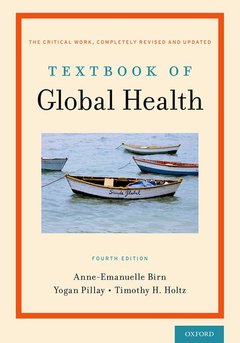Description
Textbook of Global Health (4th Ed.)
Authors: Birn Anne-Emanuelle, Pillay Yogan, Holtz Timothy H.
Language: English
Subjects for Textbook of Global Health:
Approximative price 61.17 €
In Print (Delivery period: 21 days).
Add to cart
Textbook of Global Health
Publication date: 07-2018
712 p. · 17.9x25.5 cm · Paperback
Publication date: 07-2018
712 p. · 17.9x25.5 cm · Paperback
122.75 €
In Print (Delivery period: 21 days).
Add to cart
Textbook of Global Health
Publication date: 03-2017
712 p. · 20x25.6 cm · Hardback
Publication date: 03-2017
712 p. · 20x25.6 cm · Hardback
Description
/li>Biography
/li>
The Critial Work in Global Heath, Now Completely Revised and Updated "This book compels us to better understand the contexts in which health problems emerge and the forces that underlie and propel them." -Archbishop Emeritus Desmond Mpilo Tutu H1N1. Diabetes. Ebola. Zika. Each of these health problems is rooted in a confluence of social, political, economic, and biomedical factors that together inform our understanding of global health. The imperative for those who study global health is to understand these factors individually and, especially, synergistically. Fully revised and updated, this fourth edition of Oxford's Textbook of Global Health offers a critical examination of the array of societal factors that shape health within and across countries, including how health inequities create consequences that must be addressed by public health, international aid, and social and economic policymaking. The text equips students, activists, and health professionals with the building blocks for a contextualized understanding of global health, including essential threads that are combined in no other work: DT historical dynamics of the field DT the political economy of health and development DT analysis of the current global health structure, including its actors, agencies, and activities DT societal determinants of health, from global trade and investment treaties to social policies to living and working conditions DT the role of health data and measuring health inequities DT major causes of global illness and death, including under crises, from a political economy of health vantage point that goes beyond communicable vs. non-communicable diseases to incorporate contexts of social and economic deprivation, work, and globalization DT the role of trade/investment and financial liberalization, precarious work, and environmental degradation and contamination DT principles of health systems and the politics of health financing DT community, national, and transnational social justice approaches to building healthy societies and practicing global health ethically and equitably Through this approach the Textbook of Global Health encourages the reader -- be it student, professional, or advocate -- to embrace a wider view of the global health paradigm, one that draws from political economy considerations at community, national, and transnational levels. It is essential and current reading for anyone working in or around global health.
Anne-Emanuelle Birn is Professor of Critical Development Studies (UTSC) and Social and Behavioural Health Sciences (Dalla Lana School of Public Health) at the University of Toronto, where she served as Canada Research Chair in International Health from 2003 to 2013. She is widely published in North America, Latin America, Europe, and Africa; her books include: Marriage of Convenience: Rockefeller International Health and Revolutionary Mexico (2006); and Comrades in Health: US Health Internationalists, Abroad and at Home (2013). Professor Birn's honors include Fulbright and Rotary fellowships, election to the Delta Omega Public Health Honor Society, and numerous endowed lectureships across the Americas and Asia. In 2014 she was recognized among the top 100 Women Leaders in Global Health. Yogan Pillay is Deputy Director General for HIV, Tuberculosis, and Maternal, Newborn, and Child Health Programmes in the National Department of Health, South Africa. He has 20 years' experience in the planning and implementation of health system reforms and has published widely on the topics of HIV, tuberculosis, and health systems. Timothy H. Holtz is an Adjunct Associate Professor of Global Health at the Rollins School of Public Health at Emory University. His field experience has focused on infectious disease epidemiology and disease control, and he has worked with the U.S. Centers for Disease Control and Prevention and as a consultant to the World Health Organization. From 2002-2010 Dr. Holtz worked in southern Africa, Eastern Europe, and South America on multidrug-resistant tuberculosis control and tuberculosis/HIV program capacity building. He is an internationally recognized expert on the emerging threat of anti-tuberculosis drug resistance and was part of the team of scientists that discovered extensively drug-resistant tuberculosis (XDR TB). He has also directed an HIV prevention clinical trial research program in Thailand, and an HIV and TB technical assistance program in
© 2024 LAVOISIER S.A.S.




